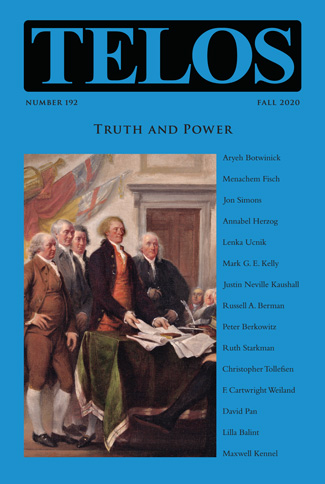In today’s episode of the Telos Press Podcast, David Pan talks with David A. Westbrook about his article “From the Ivory Tower to the Football Stadium: A Rueful Response to Michael Hüther,” from Telos 200 (Fall 2022). An excerpt of the article appears here. In their conversation they discuss Michael Hüther’s claim that the decline of truth at the university is due to moralization and economization; the traditional conception of the university that forms the background for Hüther’s critique and the function it played in society; how the role and function of the university today is different from that earlier conception and the reasons for this shift; how has university research moved from being a form of science to a form of investment; the political function of the university today; whether the ideals of merit and inclusion contradict each other; and how the university compares to a church. If your university has an online subscription to Telos, you can read the full article at the Telos Online website. For non-subscribers, learn how your university can begin a subscription to Telos at our library recommendation page. Print copies of Telos 200 are available for purchase in our online store.
|
In today’s episode of the Telos Press Podcast, David Pan talks with Michael Hüther about his article “Tired of Science?! Notes on the Relationship between University and Society,” from Telos 200 (Fall 2022). An excerpt of the article appears here. In their conversation they discuss what has become problematic in the relationship between science and truth and the relationship between science and values; how we should understand the role of myth in human society and why it continues to be important; how moralization responds to the dissatisfaction with science and the continuing relevance of myth; the dangers of moralization for the university; the driving forces behind the economization of the university as well as the consequences of this economization; how the German constitution establishes the social and political roles of the university; and how the university fulfills these roles today. If your university has an online subscription to Telos, you can read the full article at the Telos Online website. For non-subscribers, learn how your university can begin a subscription to Telos at our library recommendation page. Print copies of Telos 200 are available for purchase in our online store. In today’s episode of the Telos Press Podcast, David Pan talks with J. E. Elliott about his article “Brand English and Its Discontents: Situating Truth and Value in the University Today,” from Telos 200 (Fall 2022). An excerpt of the article appears here. In their conversation they discuss how the pressure to commercialize university work has led to the creation of academic brands; how dissent has converged with commercialization at the university; why there is a conflict between meritocracy and inclusion, and how academic branding resolves it; how the peer review process has been undermined by academic branding; what a return to meritocratic values would look like; and why it is more appropriate to speak of truth-posits rather than truth as a goal of university work. If your university has an online subscription to Telos, you can read the full article at the Telos Online website. For non-subscribers, learn how your university can begin a subscription to Telos at our library recommendation page. Print copies of Telos 200 are available for purchase in our online store. Telos 192 (Fall 2020): Truth and Power is now available for purchase in our store. Individual subscriptions to Telos are also available in both print and online formats.
First, there are natural scientific truths that even autocrats and totalitarians do not seek to deny, as they are the source of the technological tools that can support any attempt to maintain power. Here, there is certainly no conflict between truth and power. Not only does political power depend on technological achievement, but natural scientific facts cannot be covered up by lies and ideology for long. Consequently, political actors must pay attention to natural scientific and technical knowledge, even if they then instrumentalize it in different ways. American academics have much to lament about President Trump: his break with civility, his vilification of Mexicans and Muslims, his indifference to truth and to conflicts of interest, his hostility to science, his devaluation of diplomacy. Directly on campuses we recognize the vulnerability of undocumented students and dwindling numbers of international students. As a result, many faculty members and administrators have responded harshly to his presidency. Yet President Trump retains the enthusiastic support of his base. This support stems to some degree from his courage, which contrasts so prominently with normal party politicians. Trump is a fighter who speaks his mind without constraint, mocking political correctness, challenging the Washington establishment, threatening North Korea, and pulling no punches even against allies. Trump himself has elevated this virtue. His campaign posters announced: “It’s easy to stand with the crowd; it takes courage to stand alone!” But Trump is the opposite of courageous if one has any meaningful concept of this intellectual virtue. Telos Editorial Associate Jay Gupta recently spoke with C.S. Soong on Pacifica Radio’s Against the Grain, a show about politics, society, and ideas. Their conversation turned to ethics, objective vs. subjective truth, and the manner in which war is reported in the media. Listen the full interview at the Against the Grain website here. |
||||
|
Telos Press Publishing · PO Box 811 · Candor, NY 13743 · Phone: 212-228-6479 Privacy Policy · Data Protection Copyright © 2024 Telos Press Publishing · All Rights Reserved |
||||








